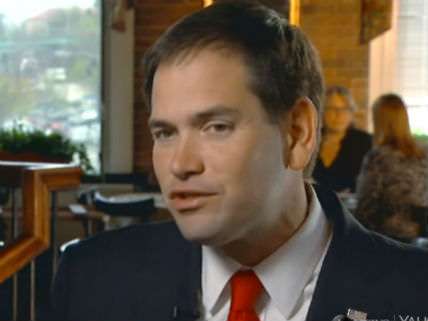Marco Rubio Stonewalls on His Pot Smoking—for the Children

In an interview with ABC News that aired today, Sen. Marco Rubio (R-Fla.) again refused to say whether he has ever smoked pot, while implicitly acknowledging that he has:
Here is the problem with that question in American politics. If you say that you did, suddenly there are people out there saying it is not a big deal—look at all these successful people who did it. And I don't want my kids to smoke marijuana. And I don't want other people's kids to smoke marijuana. I don't think there is a responsible way to recreationally use marijuana. On the other side of it, if you tell people that you didn't, they won't believe you. So it is just a worthless question.
Rubio has his eyes on the 2016 Republican presidential nomination, and his pot position is reminiscent of the one that George W. Bush took during his first presidential campaign. Here is how Bush put it in a 1998 interview with Newsweek:
If I were you, I wouldn't tell your kids that you smoked pot unless you want 'em to smoke pot. I think it's important for leaders, and parents, not to send mixed signals. I don't want some kid saying, "Well, Governor Bush tried it."
Rubio, like Bush, won't say whether he smoked pot, ostensibly because answering the question would send a bad message to impressionable teenagers. That response is tantamount to admitting that he smoked pot, since otherwise there would be no bad message to worry about. But by claiming to be stonewalling for the children, Rubio can avoid getting into potentially embarrassing details.
The implications of Rubio's argument go beyond his own biography. Judging from the federal government's survey data, a history of pot smoking is normal for men his age (43 as of May 28). In fact, allowing for a bit of under-reporting, these data suggest that most American adults born after World War II have tried marijuana. Those 111 million or so people obviously include many who nevertheless managed to do well in school, raise families, and have successful careers, in some cases marked by extraordinary achievement. Rubio's logic suggests that we should conceal this fact from children for as long as possible, lest they think pot smoking is no big deal. In that light, the Substance Abuse and Mental Health Services Administration is reckless to make such information publicly available. It is hard to convince a teenager that smoking pot will end in disaster when he knows that most people do it at some point.
Rubio's claim that there is no "responsible way to recreationally use marijuana" likewise flies in the face of reality. More than 30 million Americans consume marijuana every year. According to Rubio, every one of them does so irresponsibly, regardless of dose or context. Would he say the same thing about drinkers? If not, why not? There is no logical reason why the same rules that distinguish responsible drinking from irresponsible drinking cannot be applied to cannabis consumption.
Rubio's justification for self-censorship could extend to many subjects aside from marijuana. He told ABC's Jonathan Karl he realized that being candid about your past can be harmful after he wrote a memoir in which he recalled his mediocre performance as a high school student:
Someone came up to me and said, "You know, I enjoyed your book, but I want you to know, my son came up to me and said he doesn't have to get good grades in high school, because 'look at Marco Rubio—he didn't do well in high school, and look how successful he's been.'" And that impacted me.
This sounds like an all-purpose excuse for sanitizing your biography and refusing to answer questions about touchy subjects: I can't tell you whether I was fired for embezzling, because I don't want kids to think it's OK to steal from your employer. I can't tell you whether I was arrested for DUI, because I don't want kids to think that driving when you're drunk is no big deal. And so on.
Oddly, Rubio does not seem to worry about the message his shiftiness sends to the youth of America.


Show Comments (96)